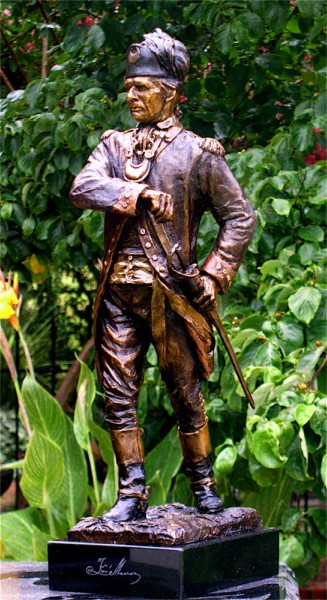
The Swamp Fox by John Oller
 John Oller, author of, American Queen The Rise and fall of Kate Chase Sprague (reviewed here), has written a new biography of The Swamp Fox. Since this reviewer first saw The Patriot, he has been curious about the man after whom the movie was modeled.  That man was Francis Marion and he didn’t bear the slightest superficial resemblance to Mel Gibson. Marion was short, slight and saturnine. But while he might not have looked like a movie star hero, he gained a reputation as a brilliant strategist who earned the loyalty and respect of those who served with him.  In fact Marion has been called “The Washington of the South.” In a footnote toward the end of the book, Oller notes,
John Oller, author of, American Queen The Rise and fall of Kate Chase Sprague (reviewed here), has written a new biography of The Swamp Fox. Since this reviewer first saw The Patriot, he has been curious about the man after whom the movie was modeled.  That man was Francis Marion and he didn’t bear the slightest superficial resemblance to Mel Gibson. Marion was short, slight and saturnine. But while he might not have looked like a movie star hero, he gained a reputation as a brilliant strategist who earned the loyalty and respect of those who served with him.  In fact Marion has been called “The Washington of the South.” In a footnote toward the end of the book, Oller notes,
… more places have been named for Marion than any other revolutionary figure, excepting Washington. According to a current memorial project in the nations capital, Marion has lent his name to twenty-nine cities and towns and seventeen counties across America, not to mention a four-year university, a national forest and a  small park on Capitol Hill that cries out for a monument in his honor.
It is no wonder that Marion garnered such acclaim, as Oller states,
Unlike many heroes with feet of clay, Francis Marion holds up to scrutiny. The more one learns about him, the more he inspires admiration.Â
 |
 |
Oller has done an impressive job documenting the life and times of Francis Marion, including 84 pages of end notes and 13 pages bibliographical sources.  Nevertheless, there are blank spots in what is known about Marion.  However, despite the sparse available data for portions of Marion’s life, Oller manages to fill in the gaps with enough surrounding history to keep the narrative flowing. In fact, in places the book felt like it was as much about Nathaniel Greene as about Marion.
Some of the most interesting parts of the book are the exchanges Oller references between Greene and Marion. At times Greene would grow frustrated with Marion, but came to see the man’s talent and value, as described in this 1781 letter,
History affords no instance wherein an officer has kept possession of a country under so many disadvantages as you have. Surrounded on every side with a superior force, hunted from every quarter with veteran troops, you have found means to elude all their attempts, and to keep alive the expiring hopes of an oppressed militia, when all succor seemed to be cut off. To fight the enemy with prospect of victory is nothing; but to fight with intrepidity under the constant impression of defeat, and inspire irregular troops to do it, is a talent peculiar to yourself.
Greene wasn’t alone in his positive assessment of Marion. Harry “Light Horse” Lee (father of Robert E. Lee) worked closely and cordially with Marion and, in his memoirs, offered the following,
He was reserved and silent, entering into conversation only when necessary, and then with modesty and good sense. Â He possessed a a strong mind, improved by its own reflections and observations, not by books or travel. Â His dress was like his address–plain, regarding comfort and decency only. Â In his meals he was abstemious, eating generally of dish, and drinking water mostly. Â He was sedulous and constant in his attention to the duties of his station, to which every other considerations yielded. Â Even the charms of the fair, like the luxuries of the table and the allurements of wealth, seemed to be lost upon him. Â The procurement of subsistence for his men, and the contrivance of annoyance for his enemy, engrossed his entire mind. Â he was virtuous all over; never even in manner, much less in reality, did he trench upon right. Â Beloved by his friends, and respected by his enemies, he exhibited a luminous example of the beneficial effects to be produced by an individual who, with only small means at his command, possesses a virtuous heart, a strong head, and a mind directed to the common good.
Lee and Marion were an unlikely duo. Â Lee was barely half Marion’s age and an urbane Virginia gentleman. Marion was plain spoken, plain looking, and had scant formal learning. Nevertheless, the two men hit it off and would work together in “one of the most successful collaborations of regulars and militia during the war.” One reason for this was because although Marion was a militia commander, he had begun his career as a regular army officer, and insisted on discipline among his volunteers.
Marion trod very carefully with respect to the management of his troops because they were all volunteers who could and would go back home if dissatisfied with their leadership. Â He had to make allowances for his men to return to their farms at harvest time. He shared their hardships as well, living in a crude lean-to hut on Snow’s Island (one of Marion’s main hideaways) at various points doing the war. This understanding of his men is what Greene was referring when he marveled at Marion’s ability to “inspire irregular” troops.
Marion also offered citizens protection and security from Tory antagonists, occasionally providing extra supplies from those plundered from the Torries. This no doubt added to the legend of Francis Marion.
Marion, like Washington, contended with his own ambition and kept his ego in check. Greene took advantage of this fact and sometimes required more of Marion than he should have, in order to keep the peace with Thomas Sumter, the Carolina Gamecock, a man who was fiercely jealous of his authority. Greene had to mollify Sumter with written confirmation that it was he, not Marion that was in charge. When Sumter grew furious over Forts Motte and Granby being taken in his absence by Lee and Marion, he threatened to resign. He wanted the honor for himself and was furious at the light terms demanded by Lee. Perhaps even more than this, was the fact that he had wanted the booty that was to have been captured had not Lee agreed with such generous terms. Â Lee had done so because he was concerned that reinforcements were on there way to the besieged Fort Granby.
In an effort to keep the Gamecock from resigning, Greene gave him some of the munitions and provisions captured at Granby in addition to slaves taken from loyalists there. Â Sumter used the latter to pay the men he’d recruited under “Sumter’s Law.” Â Sumter’s Law was the Gamecock’s solution to the problem of disappearing militiamen.
Under the informal edict South Carolinian militiamen who enlisted in a regiment of state troops for ten months would be paid–not in cash, which the government lacked, Â but with horses, clothing, equipment, and slaves taken from Tories.
Again, like Washington, Marion disliked plunder, and valued the concept of private property. Â In his view men motivated by such things might not be worth having. The Gamecock did not agree. Â When Governor John Rutledge began to see that looting Tories was counter-productive and only served to exacerbate tensions and unrest, he issued a proclamation prohibiting plundering for any purpose and requiring anyone with stolen property to return it to their owners.
Sumter took this personally, and resigned his commission, leaving Marion the supreme commander of the entire South Carolina militia. Â Greene was furious with Sumter for leaving him the lurch.
Oller does good job of highlighting Greene’s management skill in handling the prima donna personalities of many of the South Carolina militia’s officer corp. Â While he took pains to make sure Marion knew he was valued, more often than not, it was Marion who took up the slack.
Oller paints a picture of a humble man who believed in the sanctity of human life, who sought to minimize bloodshed when he could. Â It’s worth noting that while Sumter was specifically exempted by legislation to prevent lawsuits against any state or militia officers for having taken private property from citizens for use in prosecuting the war. Â It is said that Marion saw his name in the list of those protected and demanded that it be removed. Â Oller is skeptical about this, but, at any rate his name was not listed among those exempted, and neither was any suit ever brought against him for any of his actions during the war.
A few years after the end of the war, Marion, a lifelong bachelor, married at the age of 54. Â He married his first cousin, a 49 year old spinster, who had long been in love with him. Â His niece and her fiancee put the pair together. Â After their marriage in 1786, Marion and his wife lived happily until his death in 1795.
 The posts are coming!
The posts are coming!


1 comment
I enjoyed your review of “The Swamp Fox”, and plan to read the book. I have a 2nd great grandfather who was named Francis Marion, and am just now finding out about the man for whom he was named!
[Reply]
Leave a Comment